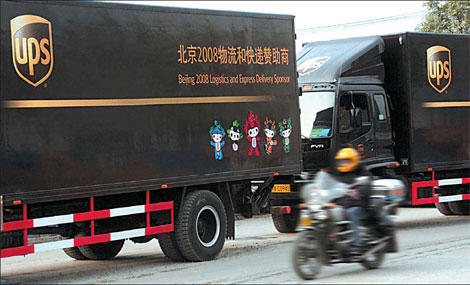


One of the busiest Olympic sponsors this year was UPS. The world's largest package delivery provider delivered more than 19 million items for the 17-day sports gala in Beijing, from the smallest shipment of commemorative pins and flash disks to 58.75 cubic meter boat frames.
As the official logistics and express delivery sponsor of the Beijing 2008 Olympic Games, the US company ran at full speed with about 2,000 people managing the warehousing and delivery of nearly everything going in and out of the competition venues and training locations.
"We are looking for better brand recognition around the world through the Olympic sponsorship. You will never find a better venue in the world to get your name out there," says Scott Davis, chairman and CEO of UPS.
"China is definitely a place for UPS to be well known because it's such an important part of our future," Davis says.
At a time when the US economic slowdown has caused an earnings decline, Asia is playing an increasingly important role to drive UPS' growth.
UPS reported a 6.7 percent revenue increase in the second quarter of this year, but an 18.3 percent decline in diluted earnings per share to $0.85 compared to $1.04 in the same period of last year. The company said rising fuel costs and a stagnant US economy caused the earnings decline in both the US domestic and international package segments.
But in Asia UPS' growth was driven by strong export volume growth in China and India.

"We had over 20 percent growth on the Asia going to Europe traffic and the intra-Asia market is also very strong," says Derek Woodward, president of UPS Asia-Pacific region.
Its most urgent task is to look for new growth engines and to rely less on the United States, according to Davis
"During my tenure as the CEO, I do want to see more diversification of revenues. I want to see UPS depend less on the US and more on the rest of the world as we move forward," Davis says.
"Today 25-30 percent of our profits are from international business. By 2010 that will be around 40 percent," Davis says.
UPS was the first foreign express carrier with wholly owned operations in China in 2005 thanks to the country's commitments to its World Trade Organization membership. The company had only about 200 employees in China in 2005, but now it has more than 5,000 employees throughout the country, representing a 20-fold growth.
"We will continue to invest heavily in China," Davis says.
Hub strategy
China has become a focal point of UPS' multi-hub strategy to ensure more efficient air service in Asia.
The Atlanta-based company will open an international air hub at Shanghai Pudong International Airport in November. The hub will connect China to the UPS global air network, including US and European destinations.
Meanwhile UPS is moving its intra-Asia air hub to Shenzhen in China's Pearl River Delta from its current location in the Philippines. The new hub, based in the Shenzhen International Airport, will be activated in 2010 and involve an estimated investment of $180 million. It will be five times the capacity of the existing hub in the Philippines. The repositioning of the hub will reduce transit times across the Asia region.
"We want to be where our customers need us most," Woodward says. "Since we began flying directly to China in 2001, we have watched this region grow exponentially not only from a small package perspective but also in heavy air freight."
Currently the express delivery markets of the Chinese mainland, Hong Kong, Taiwan, Japan and South Korea account for more than half of UPS' total intra-Asia business volume. A sizeable proportion of Asia package export volume originates in Hong Kong and southern China.
"Given the growth in shipping in southern China, it makes sense to sort and dispatch this volume from a hub closer to our customers," Woodward says.
UPS is not alone.
DHL and FedEx are also building hubs in China to grab a bigger share in the country's lucrative express delivery and logistics market.
DHL will spend $175 million to build its North Asia express transferring hub at Pudong airport. Scheduled to be completed in the second half of 2010, the hub will serve China and the vibrant North Asia region, which will contribute 30 percent of global express volume by 2015, DHL said earlier.
FedEx will open its Asia-Pacific hub in Guangzhou Baiyun International Airport in December this year with a total investment of $150 million. The Memphis-based courier previously said that the relocation of the hub from the Philippines to China is based on estimates on the growing demands for air express in the region.
(China Daily 09/01/2008 page7)













